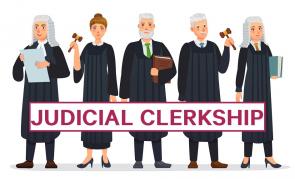
There are a couple of reasons why you should obtain a good job for the summer. Perhaps the number-one reason is to make money. Second is to secure an offer of employment once you graduate. While these are two excellent and obvious reasons, there are many other solid justifications for securing summer employment. As a legal recruiter, I have seen candidates rejected unnecessarily because a hiring coordinator erroneously perceived a red flag on their resumes. The following are things to keep in mind when trying to decide how you want to devote your summer months during law school.
What follows is an attempt to highlight how the effective use of e-mail can help you in your legal career. More importantly, we wanted to demonstrate some of the career pitfalls associated with poor uses of e-mail.
Firms want to know that you have a plan.
Because you're reading this article, you are probably in the process of or about to begin a job search. Therefore, you probably know that all firms focus on two things: academics and previous legal experience. Seems obvious, but it's a bit more involved than that. If you are a recent graduate or still in law school, what are you supposed to do about the legal experience? This is where your summers can come into play. Firms want to know that their candidates know exactly what they want and have spent every moment since walking onto their law school campus working towards that goal. If your cover letter states that you have always wanted to become a partner in a large law firm, but your resume shows one summer as a government intern and one summer with a not-for-profit, it makes it difficult for that individual to believe.
Firms want to know you want to work for a firm their size.
Law firms, bar associations, legal organizations, individual consultants, and the like have spent volumes of time and money trying to figure out how to choose a candidate that is a solid long-term prospect. Ultimately, they have found that they spend millions training young attorneys only to have them leave by the time they are truly valuable. Many times, it is a case of a candidate's deciding "I just don't want to work for a large firm" or "I believe I would be much happier in a large firm that offers more resources." While there are different benefits of large-firm and small-firm life, frankly, they don't want you to figure that out on their time. As a result, how a candidate has spent his/her time prior is indicative of what a candidate really wants and the direction he/she wants to go.
It shows a level of commitment and your desire to work hard.
It is not easy to land a summer clerkship position in a law firm. Even if you are attending a top-10 law school and are in the top 10% of your class, it is still a long, exhausting, and emotionally draining process. Law students who have utilized the services of their Career Services office, spoken to attorneys within law firms, and done their homework know that it is a process that starts early in the semester and goes on well into exams. I cannot tell you how many times I have had candidates tell me that they started looking for a job too late in the interview season or missed on campus recruiting altogether! So what did they do? They most likely took summer classes, took a position clerking for a company, or took the opportunity to travel, but did not end up in a law firm. This is a good indicator to a potential employer that you are not very goal-oriented or that you really just have no idea what you want.
Securing a job during your first summer is extremely difficult and can say a lot about you.
As I mentioned above, landing a job with a law firm takes a lot of hard work and dedication to the process. What is even more difficult and may seem near impossible is getting a job as a 1L. By no means does not working within a firm your first summer put you in a negative light, but it can have the complete opposite effect should you be one fortunate enough to secure one.
Allow the firm the opportunity to extend an offer, even if you have no intention of taking it.
Many law students choose to split their summers between two firms and subsequently receive two offers. Do not accept an offer with one firm before finding out how things would have transpired with the other. It is wise to indicate on your resume that you received an offer, as 99% of the time, a recruiter will ask. Again, this is one of those red flags that can be avoided on your resume.
Location, location, location
Firms will almost always look for a candidate's tie to a specific region, either on the resume or within the cover letter. If you spent both of your summers clerking in Atlanta, but are now seeking opportunities in Miami, again, it leads to the question of why. It may not be the case, but recruiters may assume you have exhausted possibilities in your city of choice and have been forced to look elsewhere. In a different scenario, if you grew up, attended undergraduate and law school, and lived in one particular city, it is going to be very helpful to you to have spent your summers in the city of your choice. That way, law firms will know you actually have a familiarity and most likely know what to expect.
- See Law Schools That Send the Most Attorneys to United States Supreme Court Clerkships for more information about getting a clerkship in the US Supreme Court.
About Harrison Barnes
Harrison Barnes is a prominent figure in the legal placement industry, known for his expertise in attorney placements and his extensive knowledge of the legal profession.
With over 25 years of experience, he has established himself as a leading voice in the field and has helped thousands of lawyers and law students find their ideal career paths.
Barnes is a former federal law clerk and associate at Quinn Emanuel and a graduate of the University of Chicago College and the University of Virginia Law School. He was a Rhodes Scholar Finalist at the University of Chicago and a member of the University of Virginia Law Review. Early in his legal career, he enrolled in Stanford Business School but dropped out because he missed legal recruiting too much.
Barnes' approach to the legal industry is rooted in his commitment to helping lawyers achieve their full potential. He believes that the key to success in the legal profession is to be proactive, persistent, and disciplined in one's approach to work and life. He encourages lawyers to take ownership of their careers and to focus on developing their skills and expertise in a way that aligns with their passions and interests.
One of how Barnes provides support to lawyers is through his writing. On his blog, HarrisonBarnes.com, and BCGSearch.com, he regularly shares his insights and advice on a range of topics related to the legal profession. Through his writing, he aims to empower lawyers to control their careers and make informed decisions about their professional development.
One of Barnes's fundamental philosophies in his writing is the importance of networking. He believes that networking is a critical component of career success and that it is essential for lawyers to establish relationships with others in their field. He encourages lawyers to attend events, join organizations, and connect with others in the legal community to build their professional networks.
Another central theme in Barnes' writing is the importance of personal and professional development. He believes that lawyers should continuously strive to improve themselves and develop their skills to succeed in their careers. He encourages lawyers to pursue ongoing education and training actively, read widely, and seek new opportunities for growth and development.
In addition to his work in the legal industry, Barnes is also a fitness and lifestyle enthusiast. He sees fitness and wellness as integral to his personal and professional development and encourages others to adopt a similar mindset. He starts his day at 4:00 am and dedicates several daily hours to running, weightlifting, and pursuing spiritual disciplines.
Finally, Barnes is a strong advocate for community service and giving back. He volunteers for the University of Chicago, where he is the former area chair of Los Angeles for the University of Chicago Admissions Office. He also serves as the President of the Young Presidents Organization's Century City Los Angeles Chapter, where he works to support and connect young business leaders.
In conclusion, Harrison Barnes is a visionary legal industry leader committed to helping lawyers achieve their full potential. Through his work at BCG Attorney Search, writing, and community involvement, he empowers lawyers to take control of their careers, develop their skills continuously, and lead fulfilling and successful lives. His philosophy of being proactive, persistent, and disciplined, combined with his focus on personal and professional development, makes him a valuable resource for anyone looking to succeed in the legal profession.
About BCG Attorney Search
BCG Attorney Search matches attorneys and law firms with unparalleled expertise and drive, while achieving results. Known globally for its success in locating and placing attorneys in law firms of all sizes, BCG Attorney Search has placed thousands of attorneys in law firms in thousands of different law firms around the country. Unlike other legal placement firms, BCG Attorney Search brings massive resources of over 150 employees to its placement efforts locating positions and opportunities its competitors simply cannot. Every legal recruiter at BCG Attorney Search is a former successful attorney who attended a top law school, worked in top law firms and brought massive drive and commitment to their work. BCG Attorney Search legal recruiters take your legal career seriously and understand attorneys. For more information, please visit www.BCGSearch.com.
Harrison Barnes does a weekly free webinar with live Q&A for attorneys and law students each Wednesday at 10:00 am PST. You can attend anonymously and ask questions about your career, this article, or any other legal career-related topics. You can sign up for the weekly webinar here: Register on Zoom
Harrison also does a weekly free webinar with live Q&A for law firms, companies, and others who hire attorneys each Wednesday at 10:00 am PST. You can sign up for the weekly webinar here: Register on Zoom
You can browse a list of past webinars here: Webinar Replays
You can also listen to Harrison Barnes Podcasts here: Attorney Career Advice Podcasts
You can also read Harrison Barnes' articles and books here: Harrison's Perspectives
Harrison Barnes is the legal profession's mentor and may be the only person in your legal career who will tell you why you are not reaching your full potential and what you really need to do to grow as an attorney--regardless of how much it hurts. If you prefer truth to stagnation, growth to comfort, and actionable ideas instead of fluffy concepts, you and Harrison will get along just fine. If, however, you want to stay where you are, talk about your past successes, and feel comfortable, Harrison is not for you.
Truly great mentors are like parents, doctors, therapists, spiritual figures, and others because in order to help you they need to expose you to pain and expose your weaknesses. But suppose you act on the advice and pain created by a mentor. In that case, you will become better: a better attorney, better employees, a better boss, know where you are going, and appreciate where you have been--you will hopefully also become a happier and better person. As you learn from Harrison, he hopes he will become your mentor.
To read more career and life advice articles visit Harrison's personal blog.





